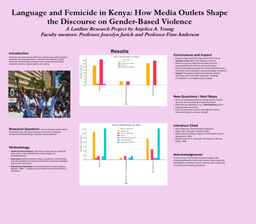Field Journal Week 3
What are some of the ethical issues that you are grappling with in your research? What are some of the ways in which you are responding to these questions?
Given that my research is based on forming counternarratives by analysing how language shapes our perception of femicide in the media, an interesting observation I made was in the naming of femicide victims: Some women were not afforded the dignity of a name in the media reports. Additionally, the victims were sometimes referred to in reference to the perpetrator of the crime. Hence, the doer of the crime could be named while the victim was left unnamed. In one of my essays in UW, I wrote on how “the naming of characters usually gives them depth. Thus, it would be quite odd that despite her main goal being to center the lives of black women, she shies away from affording the protagonist the first benefit of an identity; a name. This would make it difficult for readers to place her in archival history, since a name makes it easy to refer to someone. A name would ensure that Hartman’s goal of retelling these stories is cemented since more people would be able to cite and recreate and canonise her protagonist effortlessly. A name can eliminate the need for tangential descriptions such as ‘the girl who lived in the slum’ or ‘the girl from Lombard Street’ and so on.”
From this, we learn how naming of people is essential in ‘humanifying’ femicide victims. While this is not an ethical issue per se (on my end at least), I wonder what the implications of not naming the victims is. From a legal lens, the choice of not giving the femicide characters a name plays a role in protecting not only the victim but also the victim’s family privacy. Moreover, it gives dignity to the victim, as guidelines for reporting on violence against women emphasize the need to maintain the victim's dignity and avoid depicting them as simply a "poor" or "unfortunate" woman.
That being said, though, naming of victims adds a sense of urgency to the issue. It shows that the victims are not just mere statistics. In my interviews, I plan on bringing forward this issue to the experts in journalism.
As you continue your research, have you considered alternative viewpoints in your investigation? If so, how have these alternative viewpoints enriched or changed your project?
The element of storytelling showed up a number of times in the data I was collecting. In a way, it shaped the pathos perspective of the narratives on femicide, presumably in a bid to appeal to the emotion of the readers to understand the gravity of the issue. If I have time left at the end of my analysis, I’ll look into how storytelling has been leveraged to report on femicide cases, and what language has been employed by editors to this end. Since storytelling plays an immense role in shaping our world view, I’d be interested to see what language is employed to shape femicide narratives, and how these stories shape our perception of femicide in the media.


Please sign in
If you are a registered user on Laidlaw Scholars Network, please sign in
I really like how you bring up the dichotomy in naming and how there is a difference in legal lens vs. the urgency and tangibility of the issue. I think it demonstrates how you are taking into consideration a wide breadth of perspectives and viewpoints in your project.